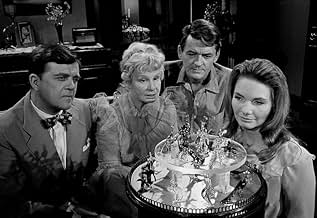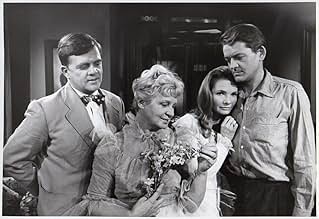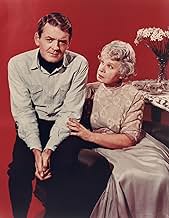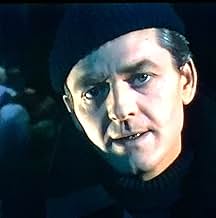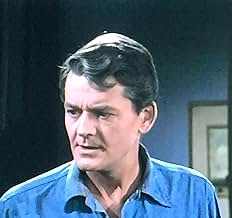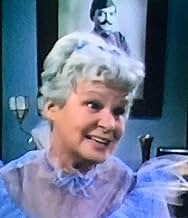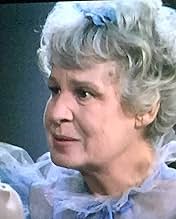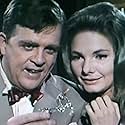Aggiungi una trama nella tua linguaAmanda Wingfield dominates her children with faded gentility and exaggerated tales of her Southern belle past.Amanda Wingfield dominates her children with faded gentility and exaggerated tales of her Southern belle past.Amanda Wingfield dominates her children with faded gentility and exaggerated tales of her Southern belle past.
- Candidato a 1 Primetime Emmy
- 1 candidatura in totale
Recensioni in evidenza
10banksh
i remember seeing this production when it premiered in 1966 (i was 15); in my mind Shirley Booth will always be the definitive Amanda Wainwright; no one else e.g. Katherine Hepburn, Joanne Woodward (although she came close) has measured up to Miss Booth's performance; i wish i could get a DVD of this production so that i could see if her performance would have the same effect on me 42 years later. If memory serves me correctly, this production was one of three plays that CBS presented in the Spring of 1966; The other two were Death of a Salesman and The Crucible. Lee J. Cobb played Willie Loman; and, like Miss Booth and Amanda Wainwright, became for me the definitive Willie Loman; I was able to obtain a DVD of this production of Death of a Salesman; Mr. Cobb's performance still to me was the definitive Willie Loman although i did noticed the play was abridged somewhat which i suspect was done so that it would fit within a specified time period; I wish that TV productions of plays were a more common occurrence.
Up until I saw this at age 10 or 11, I thought virtually everything I saw on TV was a fantasy that had no connection whatsoever to real life. Seeing The Glass Menagerie for the first time was a shock. Obviously, I can't be sure, but my recollection of the production was that it was perfect (unlike the 70s TV version with Katharine Hepburn and Michael Moriarty). Seeing it started a long involvement for me with theatre and began my search for quality television. It is my #1 "want" to see again; the last time I looked for it at the Museum of Television (several years ago), they didn't even have it. At least it is finally listed here on IMDb, for which I am thankful.
I love Shirley Booth, and I love The Glass Menagerie, but this version of Tennessee Williams's play just isn't very good. It's one of my favorite plays, with both the male and female leads highly coveted as fantastic parts in the theater. When the chemistry between the mother and son is realistic, it's magical. Shirley Booth and Hal Holbrook acted like they'd just met, which is not the chemistry required for this play.
In The Glass Menagerie, an overbearing mother with good intentions wishes her shy, crippled daughter to have male attention, or as she calls it, "gentlemen callers" as she had when she was a debutante. The son works himself raw at the factory to support the family ever since his father left, but he hates wasting his life and is already at his breaking point when the play starts. If the mother and son don't have simmering tension in-between the emotionally high arguments, the play falls flat. For some reason, Hal's timing was incredibly slow. Shirley, who you would think would play the part perfectly, just isn't believable. The mother is written to be a former belle of the ball; she used to have class and live in beautiful surroundings, which is why she wants that experience so much for her daughter. With Shirley, it isn't believable she came from class. She looks at home in her disheveled environment, and she comes across as a nag rather than as a loving mother to her children.
Pat Hingle and Barbara Loden are the bright parts of the televised play. Barbara plays the daughter, a part that's easy to dismiss. She has hardly any lines and instead has to communicate her thoughts using her facial expressions as she practically hides and cowers in the background. Barbara has an incredibly expressive face, and she communicates everything she needs to in order to make her character memorable, understandable, and sympathetic. Pat, who ironically played Barbara's father in Splendor in the Grass in 1961, plays the Gentleman Caller, which is also a difficult part to play. The Gentleman Caller has to be incredibly nice without being flirtatious, and he has to bolster the daughter's confidence without seeming romantically interested in her. Pat masters the lines. He really seems like that guy in high school that's nice to everyone and enjoyed the mandatory leadership workshop so much he continues to spout off the phrases weeks later. If either of these two characters are your favorite in the show, you can rent this version, but I prefer the 1973 adaptation instead.
In The Glass Menagerie, an overbearing mother with good intentions wishes her shy, crippled daughter to have male attention, or as she calls it, "gentlemen callers" as she had when she was a debutante. The son works himself raw at the factory to support the family ever since his father left, but he hates wasting his life and is already at his breaking point when the play starts. If the mother and son don't have simmering tension in-between the emotionally high arguments, the play falls flat. For some reason, Hal's timing was incredibly slow. Shirley, who you would think would play the part perfectly, just isn't believable. The mother is written to be a former belle of the ball; she used to have class and live in beautiful surroundings, which is why she wants that experience so much for her daughter. With Shirley, it isn't believable she came from class. She looks at home in her disheveled environment, and she comes across as a nag rather than as a loving mother to her children.
Pat Hingle and Barbara Loden are the bright parts of the televised play. Barbara plays the daughter, a part that's easy to dismiss. She has hardly any lines and instead has to communicate her thoughts using her facial expressions as she practically hides and cowers in the background. Barbara has an incredibly expressive face, and she communicates everything she needs to in order to make her character memorable, understandable, and sympathetic. Pat, who ironically played Barbara's father in Splendor in the Grass in 1961, plays the Gentleman Caller, which is also a difficult part to play. The Gentleman Caller has to be incredibly nice without being flirtatious, and he has to bolster the daughter's confidence without seeming romantically interested in her. Pat masters the lines. He really seems like that guy in high school that's nice to everyone and enjoyed the mandatory leadership workshop so much he continues to spout off the phrases weeks later. If either of these two characters are your favorite in the show, you can rent this version, but I prefer the 1973 adaptation instead.
I came upon this mid-movie on TCM. I've seen the Hepburn and Woodward versions as well as Cherry Jones on stage. This was unwatchable. Shirley Booth, normally a magnificent actress was horribly miscast. She was simply not believable as a faded southern belle. She was incredible in Come Back Little Sheba. In Menagerie, she's simply dreadful.
Hal Holbrook did a respectable job as Tom, and the reliable Pat Hingle did a fine job. Barbara Loden was adequate.
The set conveyed the appropriate claustrophobic atmosphere, but the costumes were far from period. The lime green dress Booth wore? Whose idea was that?
Very disappointed.
Hal Holbrook did a respectable job as Tom, and the reliable Pat Hingle did a fine job. Barbara Loden was adequate.
The set conveyed the appropriate claustrophobic atmosphere, but the costumes were far from period. The lime green dress Booth wore? Whose idea was that?
Very disappointed.
Tennessee Williams to me is one of the great playwrights. Even lesser work, such as 'Orpheus Descending', is better than the lesser work of many other playwrights not as influential. 'The Glass Menagerie' is one of his finest, the most poignant of his plays if not his boldest ('Cat on a Hot Tin Roof' perhaps in that regard) and all the Williams trademarks (realistic dialogue though with a lot of talk, complex characters, bold themes and powerful if quite melodramatic scenarios) are present.
Saw three versions of 'The Glass Menagerie' prior to this 1966 production with Shirley Booth, Hal Holbrook, Barbara Lodon and Pat Hingle. Which regrettably is not one of those "grew up with it and have close sentimental value to it" productions etc, being too young, and my main reason for seeing this 'The Glass Menagerie' was to see as many film/television adaptations of Williams' work as possible. My first, and my personal favourite version until seeing this, was the 1987 one with Paul Newman. Also liked quite a bit the Katharine Hepburn production, though that was not perfect. The 1950 film with Gertrude Lawrence and Jane Wyman fared least for me while still worth watching, a notable flaw being the tacked on ending. After seeing this 1966 production, this has replaced the Newman version as my favourite version of 'The Glass Menagerie'.
Do agree that some of the line delivery from Booth can be on the too quick side, but do feel that that is a trap/potential problem playing Amanda because she is so talkative. Noticed this with Hepburn too in the same role in her version.
Other than that, it is great. It still looks good, the sets being effectively claustrophobic while not ugly or too uncomfortably stifling. The costumes looked fine to me even if not the most evocative in the world. The colour looks attractive and doesn't date the production. Williams' dialogue has lost none of its edge, realism, emotion or intelligence, and never feels rambling despite the amount of talk there is, while the stage direction avoids descending into overly-overheated melodrama (which it could have been easily considering the story itself). Surprisingly, it also didn't come over as too stagy or creaky to me considering its age and medium, other later television adaptations of Williams did this aspect worse. The storytelling is compelling and suitably intense which increases throughout and the emotional power and play's spirit has not been lost, neither has the complexity of the characters. The climax is very poignant.
Regardless of any rushed line delivery, Booth is still very touching as Amanda and a powerful presence without being dominant. Holbrook has the right amount of intensity for Tom and Boden's expressive face and affectingly nuanced body language play large parts in why her Laura strikes an emotional chord. Hingle also has to be the most likeable, without being too much, Gentleman Caller there's ever been with the sincerity always ringing true. The chemistry between Booth and Holbrook doesn't always ignite, like occasionally early on, but when it grows and the tension mounts it does sear at its best.
In summation, a great production that deserves to be more widely known. 9/10
Saw three versions of 'The Glass Menagerie' prior to this 1966 production with Shirley Booth, Hal Holbrook, Barbara Lodon and Pat Hingle. Which regrettably is not one of those "grew up with it and have close sentimental value to it" productions etc, being too young, and my main reason for seeing this 'The Glass Menagerie' was to see as many film/television adaptations of Williams' work as possible. My first, and my personal favourite version until seeing this, was the 1987 one with Paul Newman. Also liked quite a bit the Katharine Hepburn production, though that was not perfect. The 1950 film with Gertrude Lawrence and Jane Wyman fared least for me while still worth watching, a notable flaw being the tacked on ending. After seeing this 1966 production, this has replaced the Newman version as my favourite version of 'The Glass Menagerie'.
Do agree that some of the line delivery from Booth can be on the too quick side, but do feel that that is a trap/potential problem playing Amanda because she is so talkative. Noticed this with Hepburn too in the same role in her version.
Other than that, it is great. It still looks good, the sets being effectively claustrophobic while not ugly or too uncomfortably stifling. The costumes looked fine to me even if not the most evocative in the world. The colour looks attractive and doesn't date the production. Williams' dialogue has lost none of its edge, realism, emotion or intelligence, and never feels rambling despite the amount of talk there is, while the stage direction avoids descending into overly-overheated melodrama (which it could have been easily considering the story itself). Surprisingly, it also didn't come over as too stagy or creaky to me considering its age and medium, other later television adaptations of Williams did this aspect worse. The storytelling is compelling and suitably intense which increases throughout and the emotional power and play's spirit has not been lost, neither has the complexity of the characters. The climax is very poignant.
Regardless of any rushed line delivery, Booth is still very touching as Amanda and a powerful presence without being dominant. Holbrook has the right amount of intensity for Tom and Boden's expressive face and affectingly nuanced body language play large parts in why her Laura strikes an emotional chord. Hingle also has to be the most likeable, without being too much, Gentleman Caller there's ever been with the sincerity always ringing true. The chemistry between Booth and Holbrook doesn't always ignite, like occasionally early on, but when it grows and the tension mounts it does sear at its best.
In summation, a great production that deserves to be more widely known. 9/10
Lo sapevi?
- QuizThe movie was lost for decades. In 2015, the unedited video footage was found and it was reconstructed using an audio recording that a viewer had captured during the broadcast and later uploaded to The Internet Archive. It aired on Turner Classic Movies 50 years from the day of the original telecast.
- ConnessioniVersion of Lo zoo di vetro (1950)
I più visti
Accedi per valutare e creare un elenco di titoli salvati per ottenere consigli personalizzati
Dettagli
- Data di uscita
- Paesi di origine
- Lingua
- Celebre anche come
- CBS Playhouse: The Glass Menagerie
- Aziende produttrici
- Vedi altri crediti dell’azienda su IMDbPro
Contribuisci a questa pagina
Suggerisci una modifica o aggiungi i contenuti mancanti

Divario superiore
By what name was The Glass Menagerie (1966) officially released in Canada in English?
Rispondi
